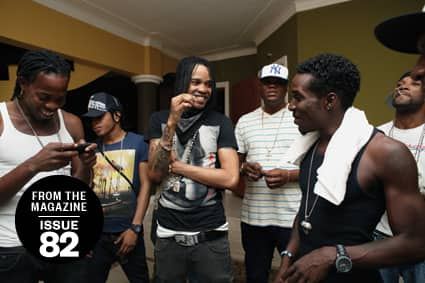 The start of August was a time of great cheer in Jamaica this year, as events commemorating 50 years of independence blended with spontaneous celebrations of its sprinters’ Olympic dominance. But the song that proved most inescapable during the revelry, and in fact for most of the summer, couldn’t have been darker. A graphic catalog of dastardly deeds and threats delivered in a schizophrenic set of vocal intonations including, but not limited to, a Crypt Keeper cackle and a black metal shriek, Tommy Lee’s “Psycho” might just be the grimmest hit in dancehall music history.
The start of August was a time of great cheer in Jamaica this year, as events commemorating 50 years of independence blended with spontaneous celebrations of its sprinters’ Olympic dominance. But the song that proved most inescapable during the revelry, and in fact for most of the summer, couldn’t have been darker. A graphic catalog of dastardly deeds and threats delivered in a schizophrenic set of vocal intonations including, but not limited to, a Crypt Keeper cackle and a black metal shriek, Tommy Lee’s “Psycho” might just be the grimmest hit in dancehall music history.
Its accompanying music video, in which lurking shottas, gyrating strippers and Lee himself all don horrific Michael Myers masks, makes for a striking counterpoint to the gated, suburban-style apartment complex where Lee has recently taken up residence in New Kingston. Inside, Lee’s girlfriend washes dishes and her young son bounces a toy soccer ball around as the men’s 200-meter final unfolds from London on a living room TV. “Some [people], when dem see mi, dem afraid,” Lee says of the gulf between his diabolical public image in Jamaica and what appears to be an unintimidating private persona. “But when dem know me, it’s a different ting.” Following the Jamaican team’s triumphant 1-2-3 finish, runner Usain Bolt, a Tommy Lee fan, quotes “Psycho” on Jamaican TV.
Lee, a native of Flankers, a community near the airport in Montego Bay, is, tellingly, a protégé of dancehall’s master manipulator Vybz Kartel. He speaks of the fiendish imagery in tunes like “Psycho” and “Uncle Demon” as a practical maneuver, a preemptive strategy mindful of dancehall’s cutthroat machinations. “You haffi mek dem afraid,” he says. “Jamaican artists take ’nuff advantage of artists [who are] weak. So you haffi just bully up di ting [and] say, Stay far from me.”
Lee’s swift emergence this year from background guy to star suggests a potential paradigm shift for dancehall: he’s Jamaican music’s first goth. He stands with his head bowed in deep thought instead of thrusting his chest outward like most Jamaican deejays. At Montego Bay’s annual Reggae Sumfest concert in July, he paced the stage in a black trenchcoat, looking like a Jamaican Glenn Danzig, his hair covering his eyes. He sees himself as a voice of a new generation of disaffected Jamaican youth, and aims to inspire them to follow in his footsteps. “Mi wan set a trend so di youth dem, they can’t help themself, they just haffi come do the same thing,” Lee says. “Mi believe in music. Mi feel everybody in the world mus’ have a tune.”
He expresses a desire to graduate to more uplifting music, and says his upcoming debut LP will contain conscious reggae tunes. But even sunny lyrics tend to sound haunted and morose coming from his mouth. As a kid, Lee’s grandfather and great uncles had a band that would play “nine night”—traditional Jamaican wakes—and it was at the vigil for his own grandfather that he was inspired to write his first lyrics. “[I don’t] know if it’s a spirit that tell me [to say] certain tings, but certain tings just come natural,” Lee says of the funereal quality of his music. “[I’m not a] demon and mi nuh worship di devil and dem tings. The [music] business is just an evil business. [None of us are] perfect. Mm-mmmm.”
Tommy Lee's Grim Reaper EP is out today via UIM Records.
Stream: Tommy Lee, Grim Reaper EP
